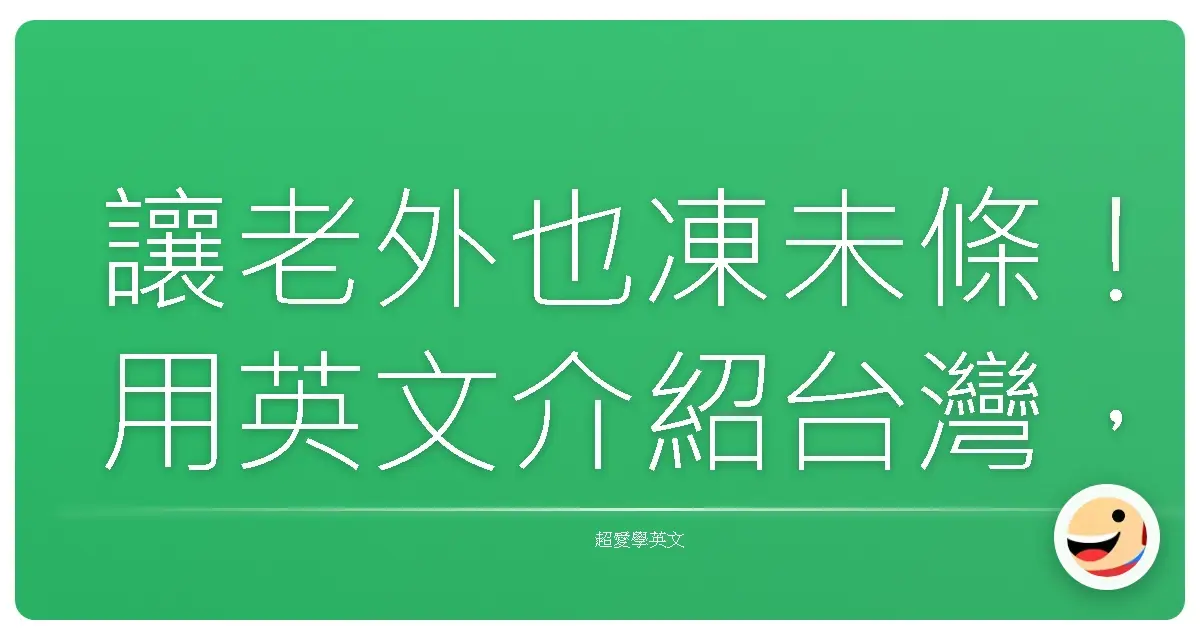
讓老外也凍未條!用英文介紹台灣,保證他們愛上這塊寶島!
這篇文章要教你如何用道地的英文介紹台灣,讓外國朋友們也能感受到台灣的美好與人情味!
開場白:讓他們一秒愛上台灣!
要介紹台灣,最重要的就是讓對方產生興趣!所以,開場白就要夠吸引人,像是這樣:
- “Hey, have you ever heard of Taiwan? It’s this amazing island near China, but it’s totally different!”
- (嘿,你有聽過台灣嗎?它是一個在中國附近的超讚島嶼,但完全不一樣!)
- “I’m from Taiwan, and trust me, you HAVE to visit someday. It’s got everything – amazing food, stunning scenery, and the friendliest people you’ll ever meet!”
- (我來自台灣,相信我,你一定要找一天來玩。這裡什麼都有 – 超棒的美食、令人驚豔的風景,還有你絕對會遇到的最友善的人們!)
重點是展現出你的熱情和自信,讓對方感受到台灣的獨特魅力!
美食天堂:吃貨們的天堂!
台灣美食絕對是介紹的重點!用生動的詞彙,讓他們光用聽的就流口水!
珍珠奶茶 (Bubble Tea / Boba Tea): “Okay, you HAVE to try bubble tea. It’s basically milk tea with these chewy tapioca balls. Sounds weird, but it’s unbelievably good!”
- (拜託,你一定要試試珍珠奶茶。它基本上就是奶茶加上QQ的木薯粉圓。聽起來很怪,但超級好喝!)
- 用法和解釋: “Tapioca balls” 指的就是珍珠,”chewy” 形容口感 Q 彈。
- 例句: “I’m craving bubble tea right now. Let’s go get some!” (我現在超想喝珍奶。我們去買一些吧!)
小籠包 (Soup Dumplings): “Imagine these little steamed dumplings filled with juicy pork and delicious broth. One bite and you’ll be hooked!”
- (想像一下,這些小小的蒸餃裡面充滿了多汁的豬肉和美味的高湯。一口咬下你就會愛上它!)
- 用法和解釋: “Broth” 指的是湯,”hooked” 是指「上癮」的意思。
- 例句: “We waited in line for an hour for Din Tai Fung’s soup dumplings, but it was totally worth it!” (我們為了鼎泰豐的小籠包排了一個小時的隊,但完全值得!)
牛肉麵 (Beef Noodle Soup): “This is like, the ultimate comfort food. Tender beef, chewy noodles, and a rich, flavorful broth. Perfect for a cold day!”
- (這就像是終極的療癒食物。軟嫩的牛肉、Q彈的麵條,還有濃郁、風味十足的高湯。非常適合冷冷的天!)
- 用法和解釋: “Comfort food” 指的是讓人感到溫暖、放鬆的食物,”tender” 形容肉質軟嫩。
- 例句: “My grandma makes the best beef noodle soup in the world.” (我阿嬤煮的牛肉麵是全世界最好吃的。)
夜市小吃 (Night Market Snacks): “Okay, night markets are a MUST. You can find EVERYTHING there – stinky tofu, oyster omelets, shaved ice… it’s a food adventure!”
- (拜託,夜市絕對要去。你可以在那裡找到所有東西 – 臭豆腐、蚵仔煎、剉冰…這是一場美食冒險!)
- 用法和解釋: “A MUST” 指的是絕對不能錯過的, “stinky tofu” 就是臭豆腐,雖然味道不是每個人都能接受,但可以描述一下它的獨特風味,例如: “It smells terrible, but it tastes surprisingly good!” (它聞起來很可怕,但吃起來卻出乎意料地好吃!)
- 例句: “Let’s hit up the night market tonight! I’m craving some takoyaki.” (我們今晚去逛夜市吧!我好想吃章魚燒。)
其他必吃美食: 你還可以介紹滷肉飯 (Braised Pork Rice)、芒果冰 (Mango Shaved Ice)、鹹酥雞 (Taiwanese Popcorn Chicken) 等等。
教學說明: 在介紹美食的時候,不要只是列出名稱,要多描述食物的口感、味道,以及它在台灣人心中的地位。像是滷肉飯,你可以說 “Braised pork rice is a staple food in Taiwan. It’s basically rice topped with this savory, melt-in-your-mouth braised pork. It’s so simple, but so delicious!” (滷肉飯是台灣的主食。它基本上就是在飯上面淋上鹹香、入口即化的滷肉。它很簡單,但超級美味!)
美麗風景:讓你嘆為觀止!
台灣除了美食,風景也是一絕!用充滿詩意的詞彙,讓他們感受到台灣的美麗。
太魯閣峽谷 (Taroko Gorge): “Imagine towering marble cliffs, rushing rivers, and lush green forests. Taroko Gorge is like something out of a movie!”
- (想像一下高聳的大理石懸崖、奔騰的河流,和茂密的綠色森林。太魯閣峽谷就像電影裡才會出現的場景!)
- 用法和解釋: “Towering” 形容非常高,”lush” 形容植物茂盛。
- 例句: “We spent a whole day hiking in Taroko Gorge. The views were incredible!” (我們在太魯閣峽谷健行了一整天。景色太棒了!)
日月潭 (Sun Moon Lake): “This is the largest lake in Taiwan, surrounded by mountains and temples. It’s so peaceful and serene.”
- (這是台灣最大的湖泊,周圍環繞著山脈和寺廟。它非常寧靜祥和。)
- 用法和解釋: “Peaceful” 和 “serene” 都是形容寧靜祥和的。
- 例句: “We took a boat ride on Sun Moon Lake and watched the sunset. It was magical!” (我們在日月潭搭船遊湖,欣賞了日落。太夢幻了!)
阿里山 (Alishan): “Famous for its stunning sunrises, tea plantations, and ancient trees. You can even ride a historic train through the mountains!”
- (以其令人驚嘆的日出、茶園和古老的樹木而聞名。你甚至可以搭乘歷史悠久的火車穿梭於山間!)
- 用法和解釋: “Tea plantations” 指的是茶園,”ancient trees” 指的是古老的樹木。
- 例句: “We woke up at 4am to see the sunrise at Alishan. It was worth it!” (我們早上四點起床去看阿里山的日出。太值得了!)
其他推薦景點: 你還可以介紹九份 (Jiufen)、墾丁 (Kenting)、澎湖 (Penghu) 等等。
教學說明: 在介紹風景的時候,可以多用形容詞來描繪,像是 “breathtaking” (令人屏息的)、”picturesque” (如詩如畫的)、”majestic” (雄偉壯麗的) 等等。
台灣人情味:最美的風景!
台灣最吸引人的地方,莫過於熱情好客的人情味!
- “Taiwanese people are incredibly friendly and helpful. They’ll go out of their way to help you, even if they don’t speak your language!”
- (台灣人非常友善和樂於助人。他們會竭盡所能地幫助你,即使他們不會說你的語言!)
- “Don’t be surprised if someone offers you food or drinks out of nowhere. It’s just their way of showing hospitality!”
- (如果有人無緣無故地給你食物或飲料,不要感到驚訝。這只是他們表達好客的方式!)
- “Even if you get lost, someone will definitely help you find your way. Taiwanese people are always willing to lend a hand.”
- (即使你迷路了,肯定會有人幫你找到路。台灣人總是願意伸出援手。)
例句:
- “I got lost in Taipei, but a kind old lady helped me find my way back to my hotel.” (我在台北迷路了,但一位好心的老太太幫我找到了回飯店的路。)
- “The owner of the guesthouse gave us a ride to the train station when we were running late. It was so kind of her!” (民宿老闆娘在我們快遲到的時候載我們去火車站。她人真好!)
教學說明: 可以分享一些你親身經歷的,關於台灣人如何幫助你的故事,這樣更能讓對方感受到台灣人情味的真實性。
台灣特色文化:與眾不同的地方!
除了美食和風景,台灣還有許多獨特的文化特色,值得介紹給外國朋友們。
台灣的廟宇文化 (Temple Culture): “Taiwan has a vibrant temple culture. You can see people praying and burning incense sticks. It’s a very spiritual experience.”
- (台灣擁有充滿活力的廟宇文化。你可以看到人們祈禱和燒香。這是一種非常精神上的體驗。)
- 用法和解釋: “Incense sticks” 指的是香, “spiritual” 形容精神上的。
- 例句: “We visited Longshan Temple in Taipei. It was so beautiful and peaceful.” (我們參觀了台北的龍山寺。它非常美麗和寧靜。)
台灣的傳統節慶 (Traditional Festivals): “Taiwan celebrates many traditional festivals, like Chinese New Year, Lantern Festival, and Dragon Boat Festival. They’re all filled with fun and excitement!”
- (台灣慶祝許多傳統節慶,像是農曆新年、元宵節和端午節。它們都充滿了樂趣和刺激!)
- 用法和解釋: 可以簡單介紹每個節慶的意義,例如: “Lantern Festival is celebrated with colorful lanterns and delicious tangyuan (sweet rice balls).” (元宵節會慶祝花燈和美味的湯圓。)
- 例句: “We watched the Dragon Boat races. It was so exciting!” (我們看了龍舟比賽。太刺激了!)
台灣的多元文化 (Multiculturalism): “Taiwan is a multicultural society, with influences from China, Japan, and indigenous cultures. This makes Taiwan a unique and fascinating place.”
- (台灣是一個多元文化的社會,受到中國、日本和原住民文化的影響。這使得台灣成為一個獨特而迷人的地方。)
- 用法和解釋: “Indigenous cultures” 指的是原住民文化。
- 例句: “You can see the influence of Japanese culture in Taiwan’s architecture and food.” (你可以在台灣的建築和食物中看到日本文化的影響。)
台灣的語言 (Language): “The official language is Mandarin Chinese, but many people also speak Taiwanese Hokkien.”
- (官方語言是中文,但很多人也說台語。)
- 教學說明: 可以教一些簡單的台語,像是 “呷飽未?” (吃飽沒?) 或 “多謝” (謝謝)。
教學說明: 在介紹台灣文化的時候,可以多分享一些你對這些文化的感受和體驗,讓對方感受到你的熱愛。
結尾:邀請他們來台灣玩!
別忘了邀請他們來台灣玩!
- “So, what do you think? Are you ready to visit Taiwan yet?”
- (所以,你覺得怎麼樣?你準備好來台灣玩了嗎?)
- “I promise you’ll have an amazing time in Taiwan. Just be prepared to eat a lot!”
- (我保證你會在台灣玩得很開心。只要準備好大吃一頓!)
- “If you ever come to Taiwan, be sure to let me know. I’d be happy to show you around!”
- (如果你有來台灣,一定要告訴我。我很樂意帶你到處逛逛!)
重點是要表達你的熱情和真誠,讓對方感受到你真的希望他們能來台灣玩!
希望這篇文章能幫助你用英文介紹台灣,讓更多外國朋友們愛上這塊寶島! 加油!